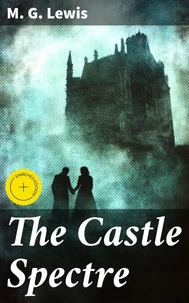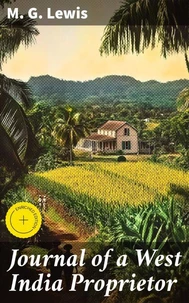The Monk. Exploring the Depths of Human Desires and Dark Consequences
Par :Formats :
Disponible dans votre compte client Decitre ou Furet du Nord dès validation de votre commande. Le format ePub est :
- Compatible avec une lecture sur My Vivlio (smartphone, tablette, ordinateur)
- Compatible avec une lecture sur liseuses Vivlio
- Pour les liseuses autres que Vivlio, vous devez utiliser le logiciel Adobe Digital Edition. Non compatible avec la lecture sur les liseuses Kindle, Remarkable et Sony
 , qui est-ce ?
, qui est-ce ?Notre partenaire de plateforme de lecture numérique où vous retrouverez l'ensemble de vos ebooks gratuitement
Pour en savoir plus sur nos ebooks, consultez notre aide en ligne ici
- Nombre de pages373
- FormatePub
- ISBN4057664190611
- EAN4057664190611
- Date de parution20/11/2019
- Protection num.Digital Watermarking
- Taille627 Ko
- Infos supplémentairesepub
- ÉditeurGOOD PRESS
Résumé
Published in 1796, M. G. Lewis'Äôs 'The Monk' stands as a seminal work of Gothic fiction, weaving a complex tapestry of intrigue, passion, and religious ambivalence. The narrative follows the tragic figure of Ambrosio, a pious monk whose descent into depravity is orchestrated by the machinations of a mysterious figure. Lewis employs rich, evocative prose interlaced with sensuous imagery and an undercurrent of psychological tension, reflecting the anxieties of a society grappling with Enlightenment ideals and the remnants of superstition.
This novel not only exemplifies the hallmark characteristics of Gothic literature'Äîsuch as decay, darkness, and moral ambiguity'Äîbut also critiques religious hypocrisy and explores the perils of unchecked desire. M. G. Lewis, an Englishman born into a prominent family, was influenced by the turbulent socio-political landscape of his time, marked by the French Revolution and the burgeoning Romantic movement.
His works frequently scrutinize the complexities of human emotion and morality, of which 'The Monk' serves as a prime example. Lewis's own experiences with the literary circles of London, including friendships with other influential writers, undoubtedly shaped his bold approach to themes of temptation and transgression. For readers drawn to the primal contradictions of human nature, 'The Monk' is an essential text that challenges the moral certitudes of its era while continuing to resonate within contemporary discourse.
Lewis's exploration of darkness and redemption offers a thought-provoking experience, making this Gothic masterpiece an indispensable addition to the literary canon.
This novel not only exemplifies the hallmark characteristics of Gothic literature'Äîsuch as decay, darkness, and moral ambiguity'Äîbut also critiques religious hypocrisy and explores the perils of unchecked desire. M. G. Lewis, an Englishman born into a prominent family, was influenced by the turbulent socio-political landscape of his time, marked by the French Revolution and the burgeoning Romantic movement.
His works frequently scrutinize the complexities of human emotion and morality, of which 'The Monk' serves as a prime example. Lewis's own experiences with the literary circles of London, including friendships with other influential writers, undoubtedly shaped his bold approach to themes of temptation and transgression. For readers drawn to the primal contradictions of human nature, 'The Monk' is an essential text that challenges the moral certitudes of its era while continuing to resonate within contemporary discourse.
Lewis's exploration of darkness and redemption offers a thought-provoking experience, making this Gothic masterpiece an indispensable addition to the literary canon.
Published in 1796, M. G. Lewis'Äôs 'The Monk' stands as a seminal work of Gothic fiction, weaving a complex tapestry of intrigue, passion, and religious ambivalence. The narrative follows the tragic figure of Ambrosio, a pious monk whose descent into depravity is orchestrated by the machinations of a mysterious figure. Lewis employs rich, evocative prose interlaced with sensuous imagery and an undercurrent of psychological tension, reflecting the anxieties of a society grappling with Enlightenment ideals and the remnants of superstition.
This novel not only exemplifies the hallmark characteristics of Gothic literature'Äîsuch as decay, darkness, and moral ambiguity'Äîbut also critiques religious hypocrisy and explores the perils of unchecked desire. M. G. Lewis, an Englishman born into a prominent family, was influenced by the turbulent socio-political landscape of his time, marked by the French Revolution and the burgeoning Romantic movement.
His works frequently scrutinize the complexities of human emotion and morality, of which 'The Monk' serves as a prime example. Lewis's own experiences with the literary circles of London, including friendships with other influential writers, undoubtedly shaped his bold approach to themes of temptation and transgression. For readers drawn to the primal contradictions of human nature, 'The Monk' is an essential text that challenges the moral certitudes of its era while continuing to resonate within contemporary discourse.
Lewis's exploration of darkness and redemption offers a thought-provoking experience, making this Gothic masterpiece an indispensable addition to the literary canon.
This novel not only exemplifies the hallmark characteristics of Gothic literature'Äîsuch as decay, darkness, and moral ambiguity'Äîbut also critiques religious hypocrisy and explores the perils of unchecked desire. M. G. Lewis, an Englishman born into a prominent family, was influenced by the turbulent socio-political landscape of his time, marked by the French Revolution and the burgeoning Romantic movement.
His works frequently scrutinize the complexities of human emotion and morality, of which 'The Monk' serves as a prime example. Lewis's own experiences with the literary circles of London, including friendships with other influential writers, undoubtedly shaped his bold approach to themes of temptation and transgression. For readers drawn to the primal contradictions of human nature, 'The Monk' is an essential text that challenges the moral certitudes of its era while continuing to resonate within contemporary discourse.
Lewis's exploration of darkness and redemption offers a thought-provoking experience, making this Gothic masterpiece an indispensable addition to the literary canon.




